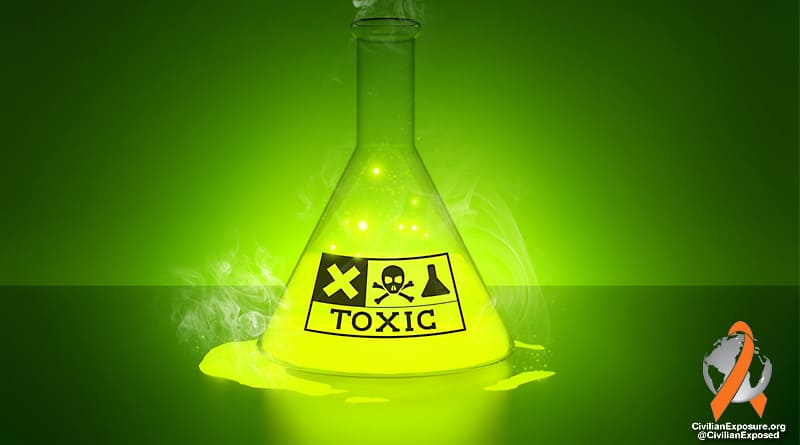
The groundwater throughout much of California is contaminated with PFAS — the “forever chemicals”
(February 18, 2020) — On September 10, 2018 the Lahontan Regional Water Board tested the well water of the home owned by Mr. and Mrs. Kenneth Culberton located at 18399 Shay Road in Victorville, California. The water was found to contain high levels of 25 separate PFAS chemicals, several that are known to be human carcinogens. Culberton’s home is a few hundred feet from the eastern boundary of the shuttered George Air Force Base.
Culberton declined to be interviewed. The letter he received from
the Lahontan Regional Water Quality Control Board on February 11, 2019 states:
“Based on the Air Force’s interview with
you, we understand that you and your tenant use bottled water as your
water source, and this well is being used only for irrigation purposes. The
comparison of the combined PFOS and PFOA concentration with USEPA’s
concentration level (see the table below) suggests that this well water may not be suitable for human
consumption as it exceeds the lifetime HA level.”
The house next door, located at 18401 Shay Road, was found to have a similarly contaminated well. The property was sold on June 19, 2018 to Matthew Arnold Villarreal as sole owner. The transfer took place three months before the well was tested by the water board. Villarreal is the Water Supply Supervisor of the City of Victorville Water Department. The level of contaminants of other private wells in the vicinity of George AFB is unknown.
George Air Force Base, which shut down in 1992, used aqueous film-forming foam (AFFF) in routine fire training exercises, along with nearly 50 other bases in the state. Per- and poly-fluoroalkyl substances, or PFAS, are the active ingredient in the foams, which were allowed to leach into groundwater and surface water.
Despite knowing since the 1970’s that the practice threatened human health, the military continues to use the chemicals at installations in the US and around the world.
Groundwater collected on September 19, 2018 at Production Well Adelanto 4 Victorville, near the intersection of Turner Road and Phantom East, also showed the presence of dangerous levels of various PFAS chemicals. The notice from the Lahontan Regional Water Quality Control Board was addressed to: Ray Cordero, Water Superintendent, City of Adelanto, Water Department.
According to the October, 2005 George AFB Restoration Advisory Board (RAB) Adjournment Report, groundwater plumes containing contaminants had not migrated into drinking water wells or in the Mojave River. “The drinking water in the community continues to be safe for consumption,” according to the final report.
People in the community have likely been drinking poisoned water for two generations. Restoration Advisory Boards have been criticized for trivializing severe environmental contamination caused by the military while serving to track and contain community resistance.
Culberton’s water puts the PFAS epidemic into perspective. The following chart is taken from the water board’s letter to Mr. and Mrs. Kenneth Culberton:
PFAS Contaminant (ppt)
6:2 Fluorotelomer sulfonate 6.6
8:2 Fluorotelomer sulfonate 6.6
EtFOSA 10.0
EtFOSAA 3.3
EtFOSE 7.9
MeFOSA 13.0
MeFOSAA 2.9
MeFOSE 12.0
Perfluorobutanoic acid 13.0
Perfluorobutane Sulfonate 20.0
Perfluorodecane Sulfonate 6.0
Perfluoroheptanoic Acid (PFHpA) 37
Perfluoroheptane sulfonate 16
Perfluorohexanoic Acid (PFHxA) 72
Perfluorohexane Sulfonate (PFHxS) 540
Perfluorononanoic acid (PFNA) 8.7
Perfluourooctane Sulonamide (PFOSA) 3.4
Perfluoropentanoic Acid PFPeA 51.0
Perfluourotetradecanoic Acid 2.7
Perfluourotridacanoic Acid 3.8
Perfluouroundecanoic Acid (PFUnA) 5.0
Perfluourodecanoic Acid (PFDA) 6.1
Perfluorododecanoic Acid (PFDoA) 5.0
Perfluouro-n-Octanoic Acid (PFOA) 69
Perfluourooctane Sulfonate (PFOS) 19

The 25 PFAS compounds found in the Culberton well totaled 940 parts per trillion (ppt.) Neither the federal government nor the state of California track or regulate contamination in private wells. Meanwhile, public health scientists have warned of the cumulative effect of these carcinogens. The nation’s top public health officials say 1 ppt of PFAS in drinking water is potentially dangerous.
The NIH’s National Library of Medicine provides a brilliant search engine that provides the toxicological effects of the contaminants above, along with others regularly found in our drinking water and environment.
Many of the substances are harmful if they come into contact with the skin. Simply click on the link to the NIH site above to begin the process of investigating the disastrous impacts on human health. Some of these chemicals are used with pesticides as the active ingredient for ant bait traps. In addition, many PFAS chemicals described above either cause or contribute to the following conditions:
- Alterations in thyroid hormone levels, especially in in aging populations
- Death from cerebrovascular disease
- Increased serum cholesterol and triglycerides levels
- Positive association between PFAS levels and ADHD
- Maternal PFAS levels in early pregnancy were associated with smaller abdominal circumference and birth length.
- Polycystic Ovary Syndrome
- Positive association between the maternal concentrations of PFOA and the number of episodes of common cold for the children
- Increased episodes of gastroenteritis.
- Mutations of DNA
- Increased levels of prostate, liver and kidney cancer
- Liver and brain dysfunction
- Airway inflammation and altered airway function
- Male reproductive disorders
- Hypoactive response to nicotine
At the risk of beating the dead horse mutagen, two of the most prevalent PFAS contaminants in Culberton’s water — PFHxS (540 ppt) and PFHxA (72 ppt) — are very common in California’s municipal water wells used for drinking water. Neither the federal government nor the state seem too concerned with these contaminants. Instead, they’re fixated on just two of the 6,000 types of PFAS chemicals — PFOS & PFOA — which are no longer produced or used.
On February 6, 2020 the California State Water Resources Control Board lowered its “Response Level” to 10 parts per trillion (ppt) for PFOA and 40 ppt for PFOS. If a water system exceeds the response levels for these carcinogens, the system is required to take the water source out of service or provide public notification within 30 days of the confirmed detection. Meanwhile, of the 568 wells tested by the state in 2019, 164 were found to contain PFHxS and 111 contained PFHxA.
Specifically, PFHxS has been detected in umbilical cord blood and is transmitted to the embryo to a larger extent than what is reported for PFOS. Prenatal exposure to PFHxS is associated with occurrence of infectious diseases, such as ottis media, pneumonia, RS virus, and varicella in early life.
PFHxA exposure may be associated with Gilbert Syndrome, a genetic liver disorder, although the material has not been widely studied. The following charts detail the state’s water systems with the highest levels of PFHxS and PFHxS in wells used for drinking water, based on the very limited 2019 data:
Water System (PFHxS in ppt)
San Luis Obispo Partners 360
JM Sims — San Luis Obispo 260
CB & I Constructors (S.L.O. 240
Strasbaugh, Inc.(S.L.O.) 110
Whitson Ind. Park San Luis Obispo 200
Golden Eagle — Contra Costa Co. 187
Oroville 175
Zone 7 Livermore 90
Pleasanton 77
Corona 61
============
Water System (FFHxA in ppt.)
San Luis Obispo Partners 300
JM Sims — San Luis Obispo 220
Mariposa 77
Burbank 73
Pactiv LLC 59
Santa Clarita 52
Friendly Acres – Tehama Co. 43
Pactiv LLC 59
Valencia 37
Corona 34
===========
All PFAS chemicals are dangerous. They’re toxic, highly mobile in groundwater and surface water, and bio accumulative. Pregnant woman in Victorville — and everyone else — everywhere else should be warned not to drink water containing PFAS.
Posted in accordance with Title 17, Section 107, US Code, for noncommercial, educational purposes